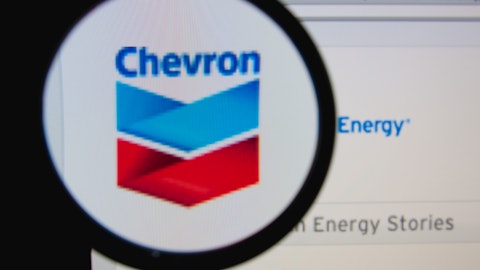Tim McKay : Yes. That’s a good question. Obviously, we need to make sure it all makes sense. And part of that is making sure that we have the provincial government and federal government and industry working together in terms of a structure for carbon capture. Obviously, it’s a big undertaking. It’s a big cost. And with the big cost, you want certainty on the rules and — as well as the financial structure of how to do it. And so I think that’s probably the #1 item going forward. In the meantime, we’re drilling the wells. We’re doing the engineering. We’re doing all the land work, the EIAs to progress that project. So there’s — to date, there’s been no showstoppers. But obviously, as you saw in the U.S. with the Inflation Reduction Act, they moved ahead of Canada.
And part of it is, you have to have a competitive financial structure here in Canada that competes against other jurisdictions. So it’s — to me, I am encouraged with the developments that we’re seeing federally and provincially, that we’ll be able to have something that works for industries in terms of carbon capture going forward.
Neil Mehta : Okay. All right. We’ll look for more clarity there. And then on WCS differentials, they blew out at the beginning of the year, late last year, and they’ve come in. I’d be curious on your view on the trajectory of WCS from here. And maybe talk — and tie in your views on TMX because that will matter for ’24 in theory?
Tim McKay : Sure. I mean with the WCS differentials, I think in our last call there, we said that there is pressure on the WCS widening in the short term. Part of it was seasonal. Part of it was natural gas prices and part of it was the reserve piece coming to market. Since that time, as we also indicated then, we had seen tightening coming into 2023. We — that has proved to be correct. Obviously, natural gas prices have reduced. The are looking and stopped and potentially go back into injection. And the product is on demand. You’re going to see some oil, let’s say, Mexico, go to its own refineries. So I feel it’s very constructive for the WCS piece. Obviously, there’s so many factors, gas price, reliability, refineries that will impact — that could impact it.
But I’m very encouraged by that for here in 2023. At TMX, I have not heard any new updates other than it’s progressing, coming on late this year or starting to mechanically be complete late this year, which, again, to me, is a positive piece for both the WCS and in general, egress out of Western Canada, because it gives you optionality. As you saw with the — when there is a pipeline issue today, on the egress side, whether it’s Line 3 or another line, it does put some pressure on the pricing here in Alberta. And so with TMX, I would think that what it will do is stabilize those pricing, so that they’re more a reflection of the true market.
Operator: There are no further questions at this time. Please proceed.
Lance Casson : Thank you, operator, and thank you to those, who joined us this morning. If you have any follow-up questions, please give us a call. Thanks, and have a great day.
Operator: Ladies and gentlemen, this concludes your conference call for today. We thank you for participating and ask that you please disconnect your lines.
Follow Canadian Natural Resources Ltd (NYSE:CNQ)
Follow Canadian Natural Resources Ltd (NYSE:CNQ)
Receive real-time insider trading and news alerts





